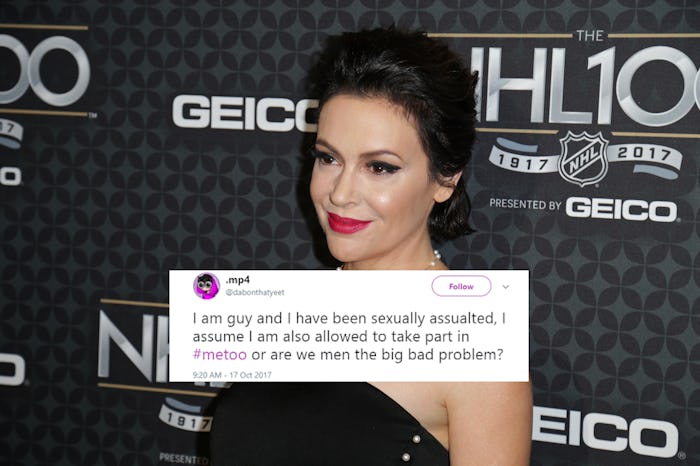News
Saying "What About Men" In Response To #MeToo Completely Misses The Point
Following an avalanche of sexual harassment and sexual assault claims against film producer Harvey Weinstein (who admitted to harassment in a statement to The New York Times but denied all allegations of assault), actress Alyssa Milano encouraged her Twitter followers to use the phrase "me too" in order to highlight just how many women have been victims of similar crimes. The phrase has been trending on multiple social media sites, but one particular type of response to #MeToo completely misses the point of the movement, so much so that it actually contributes the harm that the hashtag was meant to combat.
Milano's tweet asked "all the women who have been sexually harassed or assaulted" to write "me too" in order to "give people a sense of the magnitude of the problem," because it's not something people tend to volunteer about themselves. That leads to victims feeling stigmatized, ashamed, and alone. The sheer amount of allegations against Weinstein (more than 40 as of Wednesday, accordding to CNN) shows that it's far too common, and silencing the victims and excusing the perpetrators only serves to fuel rape culture. Millions of victims are coming forward to show solidarity with each other, but a certain subset has emerged that's not interested in solidarity, instead attempting to silence the victims once again. Perhaps a better hashtag for them would be #YesButMoreImportantlyAlsoMe.
Milano specifically requested that women use the phrase, but according to the Independent, about 30 percent of Twitter users posting about the hashtag have been men (and there's no estimate for how many gender non-conforming people used the hashtag). Some spoke up to say they stood with women who have been victimized. Some pledged to educate others about rape culture. And then there were the ones who just couldn't stand to see women in the spotlight, and took the opportunity to mansplain that actually, men can also be sexually harassed and assaulted, and the women are forgetting about them with this hashtag.
Yes, some sex crimes are committed against men, and their voices as both survivors are supporters of survivors are welcome in the #MeToo movement, but not to the extent that women's voices are minimized once again. Changing the subject like that is the same as responding to "black lives matter" with "all lives matter." It's like interrupting someone who's talking about how they broke 15 bones in a horrific car crash to tell them that one time you got a paper cut, and that also hurt very much. For survivors who have found a voice, maybe after years of silence, it reminds them that nothing they say will ever have as much value as anything uttered by a man — or that something must also be uttered by a man in order for it to be important at all.
Let's look at the statistics. According to the National Sexual Violence Resource Center, one in four girls are sexually abused before age 18, compared to one in six boys. That gender gap becomes a canyon among adults; one in five women have been raped, compared to one in 71 men. Overall, 91 percent of rape and sexual assault victims are female. And the perpetrators of sex crimes are 99 percent male, according to the U.S. Department of Justice. So just like you wouldn't show up at a 9/11 memorial to loudly proclaim that your dad died of a heart attack, and his life also had value, please don't diminish the epidemic of sexual violence against women by reminding them that focusing on them for a time isn't OK because of the men it excludes.
This reminder, though it hopes to in some way uplift male survivors, actually only shows that the person doing the reminding doesn't know how rape culture functions. Men often don't speak out about their assaults for fear of what other men will say to them. They fear being emasculated because our culture has enforced the idea that being the victim of a harassment or assault means you are weak. By fighting for more visibility and support for survivors who are women, we break down barriers that are also silencing men.
Men need to do better. If you're a man who's proud to say that you've never committed sexual harassment or assault, I've got news for you: that's not something to be proud of. You don't get a trophy. Have you ever stayed silent while your buddy hits on a woman who's clearly not interested? Do you ever excuse misogyny as "just a joke"? Did you vote for a president that bragged about committing sexual assault on camera? If so, you're part of the problem. It's time to shut up and listen to women for a change.
